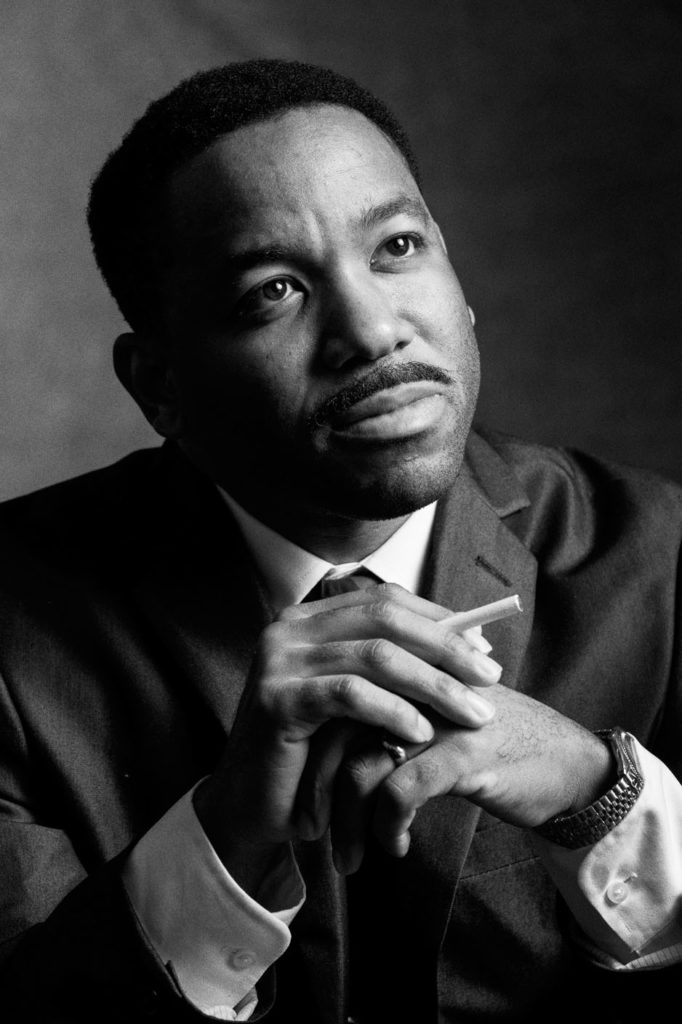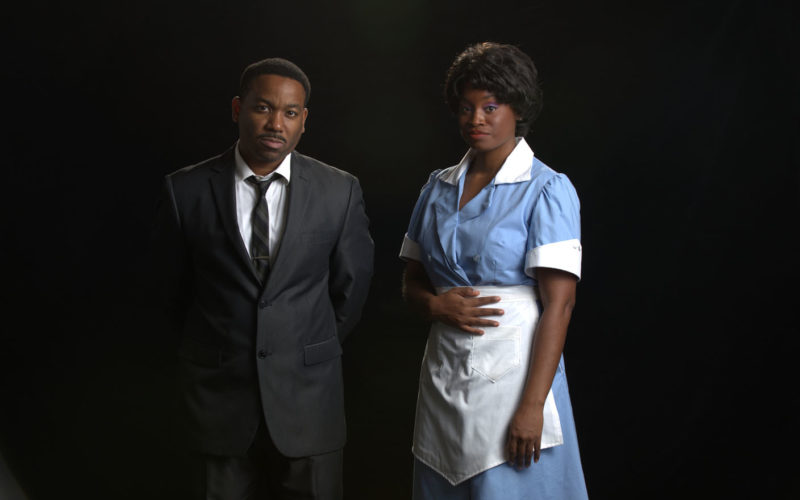April Wallace
awallace@nwaonline.com
For Clinton Lowe, the chance to channel the spirit of Dr. Martin Luther King Jr. has been there most of his life, way before he got into acting. It started in elementary school, when he won an essay contest given by a congressman in the Bronx.
As the finalist, he was awarded a gold pin and the chance to perform the essay for the public. The topic was discrimination.
“I was trying to do the best I could do, and the crowd was going crazy,” cheering and stomping, Lowe says. “My mom was there, and uncle Darin came; the pride he had, yelling out ‘Yeah yeah, that’s my nephew.’ I loved that energy.”
All the aunties told his mom that she had a little Dr. Martin Luther King Jr. on her hands. At the time, Lowe says, he only kind of knew what they meant. As an adult, he now realizes how recent King’s passing must have felt, and he recognizes that they saw hope in his words.
Lowe’s second chance to inhabit King’s spirit began Jan. 19 in “The Mountaintop,” a Katori Hall script that will be on stage at TheatreSquared through Feb. 13.
The story takes place April 3, 1968, the night before King’s assassination, when a mysterious stranger arrives at his hotel room with surprising news.
Director Vickie Washington says she was drawn to the production because the play presents a man, not the image of Dr. King, which will give audiences the opportunity to look at him as simply a human being.
“Clearly there are powers about him that he was fully able to live into and yes, he’s larger than life, but he’s a man and this is an imagined version of his last night on earth,” Washington says. Collectively, “we have chosen to fossilize him; he’s stuck at Lincoln Memorial with his speech ‘I have a dream,’ but that was ‘63.”
Aneisa Hicks, who co-stars as the enigmatic Camae, agrees that humanization of Dr. King was a huge part of the appeal of this play.

“This man’s legacy became bigger than anyone can behold,” Hicks says. “‘The Mountaintop’ puts him back in his body in ways that are 100 percent human.”
Her character is a great foil for Dr. King, challenging him and asserting herself even as she “finds her place, discovers herself and what she’s capable of … in the midst of a job,” Hicks says. In Camae’s tragedy is a vulnerability and strength. “To stand up to someone who has this larger-than-life persona and not be dwarfed, even inadvertently … shows the different ways that strength and beauty can show up.”
If your first thought is that this will be a very serious play on a very important topic, these three might agree to an extent. But they would encourage you to think again.
Lowe describes it as “funny *** [stuff]” and says to come expecting the unexpected. Washington enjoys choosing plays that have “layers upon layers,” because there’s more to be found the longer you sit with it. And Hicks says there’s a lot to this play about finding joy in the darkness. She wants people to “walk out with a renewed sense of what you may think about Black people at that time, to understand how funny and varied we are, how in tragedy we can really put stitches in our own sides and find beauty in the finality of it all.”
Washington says she never grew up thinking King was that close to her. “We always think of him as ‘holier than thou,’ but he was not,” she says.
That act of not placing his legacy at the forefront and instead finding the man underneath may be why Lowe doesn’t feel any pressure to portray King in a certain way. As he began researching King in more depth in anticipation of the role, he came across a great many things he hadn’t realized.
“This is the homie, this is (like) my uncles, my daddy, my friends,” Lowe says. “He’s way closer to home than I thought.”
Growing up in the hip hop era, Lowe says he was more interested in Malcolm X, in Black power and highlighting the economic gap between Black and white people. He and his friends were fixated more on Scarface and other characters. They could relate to their struggle, unlike Dr. King, who was not presented as countercultural. He was instead seen as the good boy, or clean, which contrasted to their own experiences of having a dirty, messy life.
“If we think of … who we’re told is relatable, it’s disappointing that King was left out of that,” Lowe says. “This gives the audience an opportunity to relate to a story in which they can see themselves.”
Doing so won’t detract from King’s greatness, Lowe says. It should instead make viewers feel like they can achieve more in life. It certainly has for him.
Lowe had seen “The Mountaintop” on Broadway and spoke with the actors after the show, but anytime he broached being a part of it, “I was always told I was too young, that I came off too young, that my energy was too young,” he says. “The opportunity is magical, a blessing. To do it at this time is something special and serendipitous.”
Washington says playgoers can expect a huge shift in the room and says they will walk out with increased power and purpose.
“Your best option is to be in the room.”
__
FAQ
The Mountaintop
WHEN — 7:30 p.m. Jan. 19-Feb. 13; weekend matinees begin at 2 p.m.
WHERE — TheatreSquared, 477 W. Spring St. in Fayetteville
COST — $41-$54
INFO — 777-7477; theatre2.org










